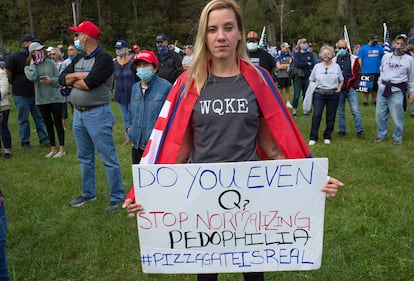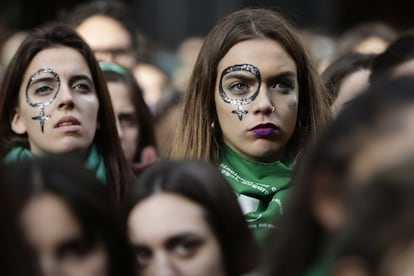You can no longer say ‘feminism,’ ‘non-binary’ or ‘immigrant’: How far-right governments restrict democracy through words
The United States, Russia and Argentina are limiting language use through their administrations, in what they describe as purge of ‘woke’ ideology

On January 20, during his inaugural address, President Donald Trump declared: “As of today, it will henceforth be the official policy of the United States government that there are only two genders: male and female.”
From that moment on, official U.S. policy became binary. The identities of trans people, among others, were buried — at least, administratively. Less than two months later, several federal agencies published a list of more than 100 words that would no longer be used in any official communications. Some examples include: activism, anti-racism, Black, gender, LGBT, Latinx, feminism, multicultural, non-binary, immigrants, vulnerable populations…
Based on these words, it’s easy to observe that women, people of color and the LGBTQ+ community will be erased from the language of American public institutions.
“The first thing an authoritarian regime seeks is absolute and unquestionable power. To achieve this, they limit dissent and then criminalize it,” says David I. Beaver, a professor of Linguistics and Philosophy at the University of Texas at Austin. “Restricting freedom of expression is simply a way to crush dissent. By identifying banned words, it’s easy to draw a line between ‘us’ and ‘them.‘”
Since Trump assumed office for the second time, the demarcation that the linguistics expert speaks of has been established by the so-called “war on woke.” The term “woke” — coined in the 1960s to define those with an awareness of inequality and other forms of social injustice — has been used as an insult for the past decade. It’s linked to the idea of “the tyranny of political correctness,” among other meanings. On one side of the battle are “progressives,” while, on the other side, are the people who leaders like Trump define as “patriots” or “defenders of freedom,” among similar labels.
“Individuals and groups not only lose their right to freedom of expression, but they may end up living in fear of using words that are essential to their identity and narrative, in addition to losing the ability to publicly defend themselves against oppression,” Professor Beaver adds. He’s referring to the groups that are classified among the “enemies” singled out by administrations like Trump’s. In this way, language restrictions are not only confined to an administrative document: they gradually extend to other social spheres. “Knowing that the simple use of certain words on social media or in a private message can be used against [you] creates an environment of self-censorship,” the Austin academic continues. “Silencing them not only restricts the rights they once had, but also prevents them from achieving the rights that others take for granted.”
In 2024, Javier Milei’s government banned inclusive language and “anything related to the gender perspective” in the Argentine public administration. “The letter -e, the @ sign and the -x will no longer be used, [while] the unnecessary inclusion of the feminine [noun] in all documents will be prevented,” one of the far-right president’s spokespeople announced. Milei considers equality policies to be part of the “indoctrination of cultural Marxism.” On more than one occasion, he has stated: “Gender ideology and inclusive language only destroy the values of society.”
With this decision, the Argentine president attempted to erase some of the gains of the feminist movement with a stroke of his pen. The -e (the symbol for “gender-neutral”) gained visibility in 2018, during the country’s mass demonstrations in favor of legalizing abortion. The process began in secondary schools. Eventually, six universities accepted “inclusive and non-sexist language expressions in written and oral productions” as being valid. Subsequently, the Argentine Judicial Council authorized judges to write with the morpheme.

“This isn’t so different from what’s been done in France since 2023, when a bill was passed to invalidate any official document written in inclusive language, including contracts and communications from public officials. Macron himself has argued that, in French, the neutral form is provided by the masculine,” says Jahel Queralt, a lecturer in the School of Law at Pompeu Fabra University, in Barcelona. “The University of Barcelona (UB), for example, has decided to resume using the generic masculine in its normative texts. [The university authorities] argue that, as an unmarked grammatical gender, ‘it does not exclude women or non-binary people,‘” the expert points out.
The Spanish Congress stopped using the surname “de los Diputados” (diputados being the male form of “deputies”) in 2024 and became simply “Congreso,” as a result of the rewriting of the Chamber’s Rules of Procedure to adapt them to inclusive language. At the time, the Royal Spanish Academy (RAE) criticized the policy because this document didn’t comply with “the current grammatical rules and recommendations” published by the Academy in a January 2020 report. The “most contentious point” for the RAE was “the so-called ‘inclusive masculine,’ about which there are fundamental disagreements.”
In Russia — another country led by a far-right leader — using the feminine form has become a risky sport. At the end of 2023, the Russian Supreme Court declared what it referred to as the “international LGBT Movement” as being illegal. In its ruling, the court mentioned the use of the feminine gender in language as a practice that could be a prosecutable offense. However, the use of these feminine endings (-ka, -tsa, -niya, -sha) is quite widespread in Russian, a language based on declensions, like Greek. For example, the feminine form of “aktior” (actor) is “aktrissa.”
It was unclear whether the Russian court’s reference to the use of these words set a legal precedent. According to federal legislator Vitaly Milonov, “feminism, homosexuality and other Satanisms should be recognized as extremist… at least in the sphere of education.” This was reported by EL PAÍS correspondent Javier G. Cuesta, from Moscow.

In January of 2024, the Higher School of Economics (HSE), one of Moscow’s leading universities, banned its students from using feminized nouns. The risk, says Russian activist Daria Sarenko, is ending up in jail. This happened to her, after she was accused of being an “extremist” and an “enemy of the people.” The feminist writer, exiled in Spain after fleeing Russia following the invasion of Ukraine due to the regime’s persecution of dissidents, spent 15 days in prison for cultural demonstrations, such as when she led “silent” protests. For instance, she walked alone on the Moscow subway, carrying signs that displayed political and feminist reflections.
“I think it’s a different discussion than the one about banning concepts,” Queralt adds. Something similar happened in 2017, during the previous Trump administration (2017-2021). “I found the prohibition of science and evidence as the foundations of public policy particularly troubling. If ‘evidence-based’ is no longer a standard, what criteria do you use to make decisions in public health? If you prohibit a concept, you limit the production of data related to it. How do we conduct research on fetuses if we can’t use this word? If they can’t be used in official reports or statistics, then what isn’t named isn’t measured… and what isn’t measured isn’t managed,” Queralt laments.
The Chilling Effect
If what isn’t named isn’t managed, or is difficult to measure, does it cease to exist? Are the rights of certain groups, for example, limited? “This is an oversimplification,” Beaver clarifies. He gives an example from his home country: “In applications for funding from the National Science Foundation (NSF), the use of the word ‘woman’ is restricted. This doesn’t mean that women have ceased to exist or that the concept will cease to be used. Rather, applicants will understand that certain types of research and teaching on gender are no longer permitted. This will generate a chilling effect, limiting knowledge about the effects of gender in certain subjects, reducing public awareness about gender discrimination and pushing those working on these theories out of visible spaces, such as academia.”
The language decisions made by Trump, Milei and Putin have precedents in other far-right governments. “Mussolini restricted the use of foreign words and promoted terms with Latin roots. The Nazis not only created their own propaganda language, but also vilified words considered Semitic, with the aim of constructing a new way of thinking,” Beaver points out.
Queralt adds to this, giving a more recent example. “DeepSeek [artificial intelligence] models incorporate censorship mechanisms for topics considered sensitive by the Chinese government, limiting responses related to delicate political or social issues. It reminded me of George Orwell’s fictional language, Newspeak, in [the novel] 1984, in which the systematic elimination of words prevents the development of discourse that’s contrary to the regime.”
“Once these governments end,” Beaver concludes, “the institutions and language of democracy must be rebuilt from scratch. Banning words is just one of the many tools used to foster ignorance about how democracy works and [is part of] the nature of oppression.”
Sign up for our weekly newsletter to get more English-language news coverage from EL PAÍS USA Edition
Tu suscripción se está usando en otro dispositivo
¿Quieres añadir otro usuario a tu suscripción?
Si continúas leyendo en este dispositivo, no se podrá leer en el otro.
FlechaTu suscripción se está usando en otro dispositivo y solo puedes acceder a EL PAÍS desde un dispositivo a la vez.
Si quieres compartir tu cuenta, cambia tu suscripción a la modalidad Premium, así podrás añadir otro usuario. Cada uno accederá con su propia cuenta de email, lo que os permitirá personalizar vuestra experiencia en EL PAÍS.
¿Tienes una suscripción de empresa? Accede aquí para contratar más cuentas.
En el caso de no saber quién está usando tu cuenta, te recomendamos cambiar tu contraseña aquí.
Si decides continuar compartiendo tu cuenta, este mensaje se mostrará en tu dispositivo y en el de la otra persona que está usando tu cuenta de forma indefinida, afectando a tu experiencia de lectura. Puedes consultar aquí los términos y condiciones de la suscripción digital.









































